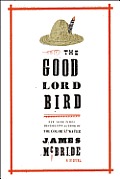 I last read James McBride several years back and loved his Miracle at St. Anna’s but somehow didn’t return till now. And yes, here I am at last with The Good Lord Bird, McBride’s version of the story of John Brown’s 1859 attempt to take Harper’s Ferry and try to spark an uprising of slaves all over the U.S.
I last read James McBride several years back and loved his Miracle at St. Anna’s but somehow didn’t return till now. And yes, here I am at last with The Good Lord Bird, McBride’s version of the story of John Brown’s 1859 attempt to take Harper’s Ferry and try to spark an uprising of slaves all over the U.S.

The story is told through the eyes of one Henry “the onion” Shackleford, as told to his congregation mate, Charles D. Higgins of The First United Negro Baptist Church of the Abyssinia in 1921, and found in notebooks, among which is a feather from a near-extinct Ivory Wookpecker, discovered when the church, located in Wilmington, Delaware, burned in 1966. Shackleford, according to his biographer, was 103 or so at the time he related his story. His nickname was “Onion,” dating from a sobriquet Brown himself bestowed on him shortly after “rescuing” him from slavery and feeding him the only comestible he had in his pocket.
[If all that isn’t aside enough, I have a little BTW of my own. My great-grandparents came across the plains in 1864 in a wagon train of which John Brown’s widow was a member. She settled with her sons in Northern California and lived out her years in various locations there. Thus, I have a tenuous interest in John Brown, though I never pursued it, and found it both entertaining and enlightening to see read how McBride’s character described the legendary abolitionist. ]
Why McBride wanted to put so many layers between Onion and his story, I don’t know. Maybe it’s in fashion. Philip Meyer used the same conceit in The Son recently. No mystery there, since he wanted to show the whole sweep of Texas history, where McBride concentrates only on the couple of years leading up to Harper’s Ferry. Whatever. Here’s Onion:
I was born a colored man and don’t you forget it. But I lived as a colored woman for seventeen years.
Ever read a better opener? Bet not. He goes on like that. Take this description of a shootout:
He staggered back, dropped to the floor, and blowed out his spark right there.
Supposedly quoting John Brown: I’m keeping a man with a muzzle trained on this door. If you or anybody else pokes their head outside it, they gonna chew a powder ball.
A shooter is said to have buttered []his victim] with lead and powder.
Some great cussing: You done put me in the fryer, you God-damned pebble-mouthed, wart-faced ship of shit.
Remind you of anyone? Twain couldn’t have gotten away with some of the profanity, but Onion’s character obviously owes a lot to Huck Finn, and McBride’s unsurpassed for colorful language.
As for the story itself, Onion, “rescued” from slavery at age twelve, finds it much harder to survive being “free” as part of Brown’s pitiful “army” than he ever did in his fairly comfortable life as a the slave son of a slave father who was a barber. His wandering up and down the country with this hard-praying lunatic, getting into gunfights, all disguised as a girl to avoid attention, with little food and a lot of danger makes for a rough life. He even follows Brown back east on a fundraising trip during which Brown uses him as a poster boy/girl to pull money out of abolitionists. He meets Frederick Douglass, who gets drunk and makes a pass at him. McBride’s not afraid to knock the clay feet out from under icons. Onnion meets Harriet Tubman, who is beyond wise, and was willing to help Brown achieve his purpose, but not on his suicidal terms, and Brown wouldn’t listen to her.
The Good Lord Bird is a coming-of-age novel for Onion, but it’s also a spiritual guide to the imperfections of the human spirit and the necessity to rise above them and see the way to a life beyond ourselves. John Brown, for most of the book, is a mad fool, an object of scorn, derision, and pity. In the end, though, when Onion visits him in his cell just before his hanging, it turns out he’s self-aware as can be. His raid failed to achieve its immediate goal, but he knows he’s contributed to a future when it will happen, a future he’ll never see but which he knows is coming. McBride wraps all this up beautifully in a poetic ending where Onion watches a huge black and white bird, one of those Ivory woodpeckers whose feather Onion kept till he did, a “Good Lord Bird” which John Brown revered as emblematic of the human soul, circling ‘round, looking for a tree to roost on, a bad tree, I expect, so he could alight upon it and get busy, so that it would someday fall and feed the others.
